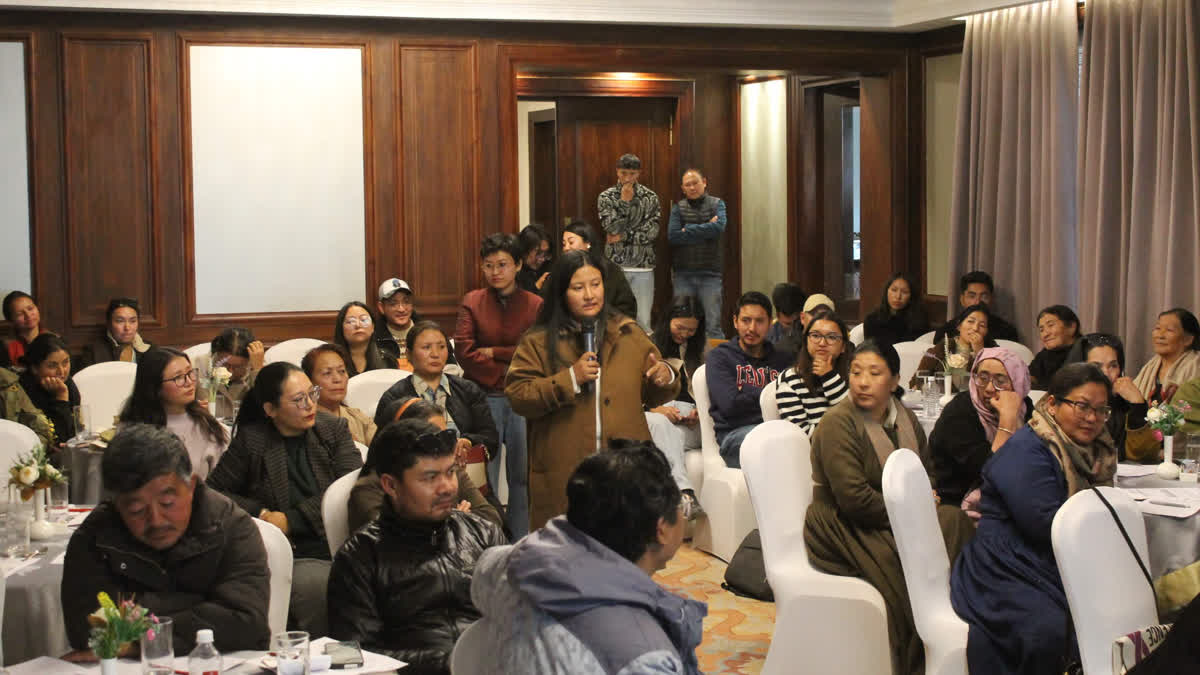Leh: A programme on 'Strengthening psycho-socio-legal response to domestic violence' was organised by the Department of Social and Tribal Welfare District Hub for Empowerment of Women, Leh, Mission Shakti today here.
Tashi Dolma, Director, Social and Tribal Welfare Department, Ladakh, said, “We have several schemes, including Mission Shakti, which focuses on empowering women. Raising awareness about domestic violence is also one of our key mandates. Although the Domestic Violence Act was enacted in 2005, many women remain unaware of their rights under it. Recognizing this, we’ve organised sessions with experts to address the social, legal, and psychological aspects of domestic violence."
Dolma further said that the survivors who have reported abuse have also shared their experiences in these sessions. "We plan to extend these awareness programs to villages and subdivisions, using women empowerment hubs to reach more people and foster understanding," she said.
Essar Batool, a professional social worker focused on gender and violence, discussed how violence often begins even before birth, with a societal preference for male children. She explained, “Patriarchy harms not only women but men too, restricting their emotional expression and creating a stigma around openly showing vulnerability.” She talked about gender roles that are imposed early, with boys given toy guns and girls provided with dolls. She highlighted the unfair division of labour in the home, highlighting gender inequality.
She emphasised the importance of creating a support network for survivors to help them break the cycle of generational trauma. She pointed out that, according to NCRB data, only nine cases of crimes against women were reported in Ladakh in 2020, with zero cases of domestic violence reported in subsequent years. She suggested that Ladakh's close-knit society, where ‘everyone knows everyone,’ contributes to the underreporting, along with the stigma, shame, and pressure to preserve family honor that often silences victims. Other barriers include lack of support from family or friends, denial of the seriousness of abuse, limited access to social and legal resources, fear of victim-blaming, and facing misogyny from authorities.
Batool highlighted the need for awareness on the Protection of Women from Domestic Violence Act (PWDVA) 2005 and she advocated for strengthening the role of NGOs, community-based interventions, and legal and institutional frameworks to create a safer environment for all.
Dr. Padma Angmo, a psychiatrist, SNM Hospital, Leh, highlighted the growing mental health challenges in Ladakh, sharing that her youngest patient with depression is just six years old. She said, “The family should be a safe space, especially for women, but often, cases go unreported. It’s important to understand the societal factors contributing to this issue and bring these discussions to the forefront.”
Dr Angmo said that from January to mid-November 2024, she has handled 400 cases of alcoholism, along with numerous cases related to panic attacks, suicidal tendencies, and drug addiction. “Only by addressing these issues openly can we build awareness and foster sensitivity. Domestic violence is one of the most prevalent yet largely invisible forms of violence,” she stated. She also highlighted the cycle of abuse and its detrimental impacts on both physical and mental health.
Speaking on domestic violence, she stressed the importance of sensitizing healthcare professionals to identify and support victims. Key measures include routine screening of all women for domestic violence, maintaining a registry, mandatory referrals to psychiatry or mental health professionals, and ensuring a reliable referral and safety network. She called for training in digital safety, ongoing sensitization, and a structured approach to help prevent abuse and promote a healthier society.
Discussing the way forward, Aamir Sohail, a professional social worker with the Special Cell for Women in Leh, emphasized key steps to combat gender-based violence. He stated, “We need to reduce isolation, promote equal power dynamics, and believe women. It’s essential to hold men accountable and to eliminate any tolerance for violence as an acceptable option.” He highlighted the importance of empowering women to increase their self-respect and sense of control, while also encouraging men to take responsibility for their actions. He stressed the need for consistent follow-up on cases of violence against women with the police, courts, and government institutions to ensure justice and accountability.
Read More:
1. PM Modi Writes: Ratan Tata Empowered A Generation Of Dreamers, His Compassion Extended To All



